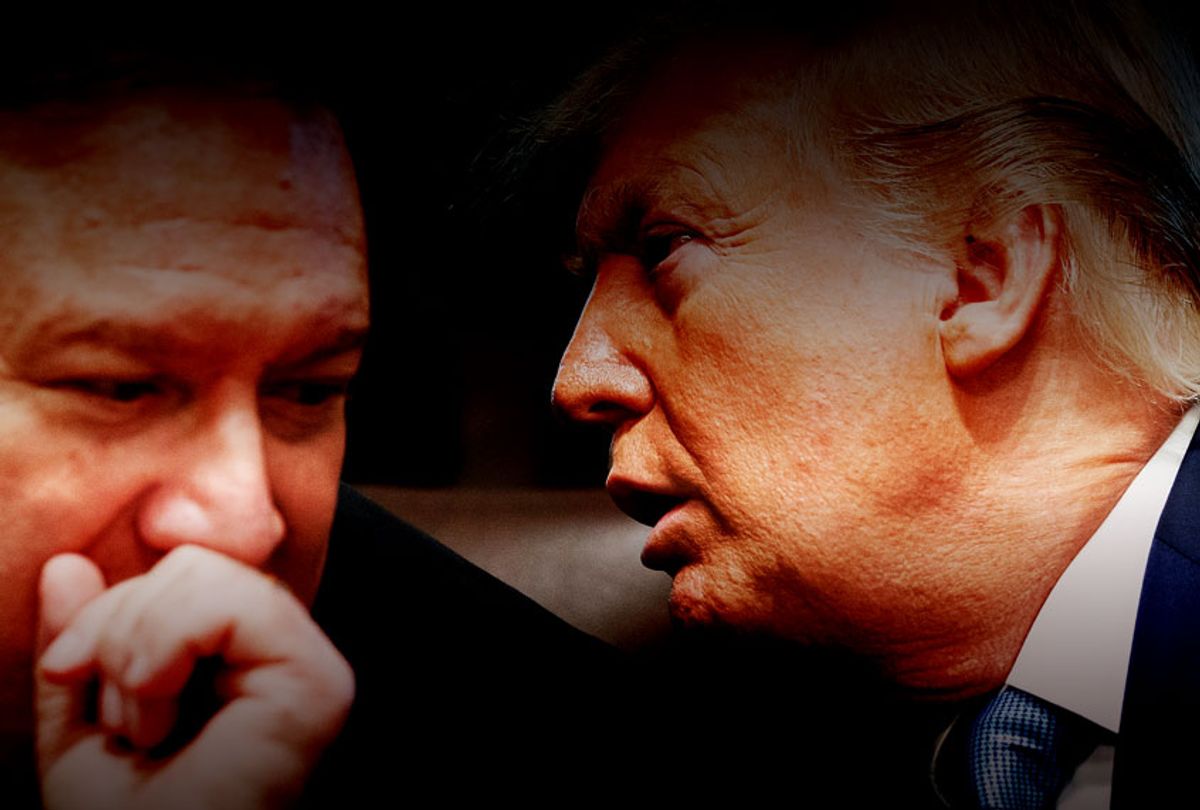President Donald Trump claimed that Iran's Qassem Soleimani plotted to blow up U.S. embassies when he was killed last week, but Secretary of State Mike Pompeo admitted that the administration had no idea when or where an attack would take place.
"We caught a total monster. We took them out, and that should have happened a long time ago," Trump told reporters on Thursday. "We did it because they were looking to blow up our embassy."
"We also did it for other reasons that were very obvious. Somebody died . . . People were badly wounded just a week before. And we did it. We had a shot at it . . . that was the end of a monster," the president added, referring to an attack by an Iranian-backed militia, which killed an American contractor.
Speaking later at a rally in Toledo, Ohio, Trump claimed that Soleimani planned to attack embassies.
"Soleimani was actively planning new attacks, and he was looking very seriously at our embassies, and not just the embassy in Baghdad," Trump told his supporters. "But we stopped him, and we stopped him quickly, and we stopped him cold."
A senior defense official told CNN that there was intelligence suggesting that Soleimani was involved in multiple plots, including a plan to attack the embassy, but the network noted it could not “confirm claims” by Trump or the official.
Secretary of State Mike Pompeo, who repeatedly claimed that Soleimani was killed to stop an “imminent” attack, admitted in a Fox News interview on Thursday that the administration actually did not know when or where an attack would take place.
"There is no doubt that there were a series of imminent attacks that were being plotted by Qassem Soleimani,” Pompeo told the network before adding: "We don't know precisely when, and we don't know precisely where, but it was real."
National security attorney Bradley Moss pointed out that Pompeo’s comments, by definition, meant the attack was not “imminent.”
“This clip is going to look incredibly awkward mashed up against Republican lawmakers saying they were given crystal clear evidence of a specific, imminent threat,” added MSNBC reporter Garrett Haake.
Haake was referring to a briefing delivered to lawmakers by Pompeo, Defense Secretary Mark Esper, and other top administration officials on Wednesday. Though some Republicans praised the briefing, Sen. Mike Lee, R-Utah, and Sen. Rand Paul, R-Ky., were incensed that the Trump administration officials refused to provide lawmakers with any clear answers.
Lee said it was the “probably the worst briefing I've seen at least on a military issue in the nine years I've served in the United States Senate." Paul said the administration's claim that the 2002 authorization of military force allowing the Bush administration to invade Iraq also authorized the strike that killed Soleimani was both “absurd” and an “insult.”
Democrats came away from the briefing confident that there was no actual intelligence suggesting an imminent attack.
“If there is evidence there, we have not seen it,” Rep. Pramila Jayapal, R-Wash., told reporters Wednesday. “[President Trump] had no evidence of an imminent attack, and we say that coming from a classified briefing, where again, there was no raw evidence presented that there was an imminent threat.”
“I was utterly unpersuaded about any evidence about the imminence of a threat that was new or compelling,” Rep. Gerry Connolly, D-Va., added.
“This appears to me to be a strike of choice by this administration — one that likely would have required congressional authorization beforehand,” Sen. Chris Murphy, D-Conn., said. “There are serious political consequences to the decision that was made, and we did not get information inside that briefing that there was a specific imminent threat that we were halting under the operation conducted last Thursday night . . . I think it is likely that it doesn’t exist.”
The House of Representatives voted Thursday mostly across party lines on a resolution that requires Trump “to terminate the use of United States armed forces to engage in hostilities in or against Iran or any part of its government or military” unless Congress declares war or there is “an imminent armed attack upon the United States.”
The measure would still need to be approved in the Senate, where it appears to have little support beyond Lee and Paul.
Sen. Chris Van Hollen, D-Md., told MSNBC that the lack of intelligence behind Trump’s claim that Soleimani planned to blow up embassies showed the need to rein in the administration’s ability to wage military action.
"It just shows how they're making this up as they go,” he said. “They would have presented that kind of evidence yesterday — if they had it."



Shares